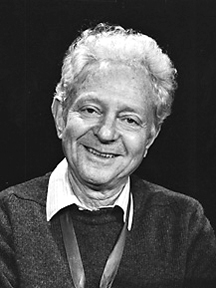Symposium on Physics Education
2009 Symposium Planning Committee
Leon Lederman with Patrick Callahan, Paul Hickman, Shannon Mandel, Rex Rice, Dianne Riendeau and John Roeder.
Moderator
Leon Lederman
Leon Lederman has worked tirelessly to raise awareness for what he calls a potential revolution in science education. He wants Physics First efforts that preserve the integrity of the three core disciplines while connecting them to form a coherent high school science sequence.
Panelists
Paul Hickman
Science Education Consultant
23 Rattlesnake Hill Road
Andover, MA 01810
hickmanp@comcast.net
Paul Hickman, a longtime physics teacher and Physics First advocate, will set the stage for the discussions with an overview of this movement to reorder the traditional high school science sequence.
Marsha Rosner
Director and Charles B. Huggins Professor
Ben May Institute for Cancer Research
The University of Chicago
Chicago, IL 60637
mrosner@ben-may.bsd.uchicago.edu
Marsha Rosner studies how biochemical signals promote the growth, differentiation or death of cells. She will share her thoughts about how physics can support understanding in high school biology and chemistry.
Ronald S. Kahn
Director of Client Services
East Bay Educational Collaborative
317 Market Street
Warren, RI 02885
rkahn@cox.net
Ron Kahn, a former award winning physics teacher, will speak to the statewide efforts initiated by Rhode Island’s Governor Donald Carcieri. The project seeks to implement an improved science sequence in the State’s high schools.
Gabriel de la Paz
Physics Teacher
Clayton High School
1 Mark Twain Circle
Clayton, MO 63105
delapaz@clayton.k12.mo.us
Gabriel de la Paz, an active high school physics teacher will speak to the A-TIME for Physics First statewide partnership effort in Missouri. He serves as a peer teacher for their professional development efforts.
Corinne Williams
Asst. Supt. for Teaching & Learning
Bremen High School District 228
15233 Pulaski Road
Midlothian, IL 60445
cwilliams@bhsd228.com
Corinne Williams, who is now an Assistant Superintendent at a local area school system, will share some data, observations and thoughts from her doctoral work on Physics First.
John Hubisz
North Carolina State University
1604 S. Salem St.
Apex, NC 27502
hubisz@unity.ncsu.edu
John Hubisz, who just completed a review of textbooks appropriate for Physics First, will speak to the instructional materials available to support early high school physics courses.
2009 Winter Meeting Symposium on Physics Education

 “Early High School Physics: Building a Foundation for Understanding the Sciences” Considered by many to be the most concrete of the sciences, physics is the basis for understanding the more abstract concepts introduced in chemistry and biology. At an earlier time when biology primarily concentrated on classification and chemistry focused on applications rather than the atomic structure of matter, it made more sense to follow a biology/chemistry/physics sequence. Putting physics first gives students a basis for understanding the theoretical nature of more advanced science concepts. |

